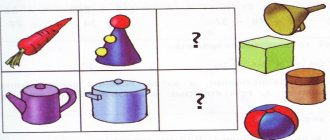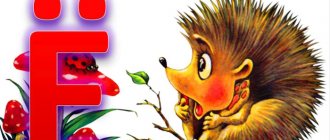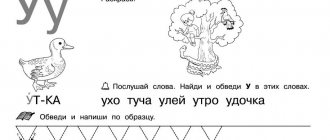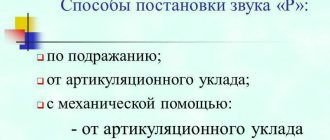Literacy training in the senior group
It is at the age of 5-6 years that children usually begin to actively teach literacy and spend time developing speech: distinguishing sounds and letters, reading individual words and sentences, putting emphasis.
Preschoolers learn to find the right words to name objects in pictures, make sentences, and draw diagrams of words.
Children also train and prepare their hands for writing: they draw and paint a lot, shade, trace the contours of objects, and learn to write letters little by little.
MAGAZINE Preschooler.RF
An open literacy lesson in a pre-school group. Topic: “Journey to the Land of Grammar.”Educator: Guseva A.P. MDOU No. 60 “Rodnichok”
Goal: To consolidate the knowledge, skills and abilities acquired by children, developed in literacy classes.
Tasks:
- Fix the image of the letters;
- To train children in the ability to perform sound analysis of words, divide words into syllables, highlighting the stressed syllable;
- Clarify the concepts of “sound” and “letter” ;
- Continue to teach children to compose sentences with a given word, analyze them, write graphic notes for them using writing rules;
- Strengthen the ability to work in a notebook and at the board;
- Develop the ability to listen to comrades and not interrupt each other.
Materials for the lesson: Card “Which letter looks out of the window” ; book word diagram; puzzles; chips (red, green, blue); letters to form words; sticks; notebooks; simple pencils.
Progress of the lesson:
Q. Guys, what are your mood today?
D. Good, cheerful, joyful...
B. Let's hold hands and convey our good mood to each other.
All the children gathered in a circle, I am your friend, and you are my friend, Let’s hold hands tightly and smile at each other.
Give your smiles to our guests.
Q. Children, today our group received an interesting letter from one wonderful, magical country - Grammar. Sounds, letters, words live there. Residents of this country wrote that they want to find friends. Would you like to meet them?
D. Yes!!!
Q. In this country you will find interesting tasks that you must complete. If you complete all the tasks, a reward awaits you.
Well, are you guys ready to go to the land of Grammar?
D. Yes!!!
Q. I have a magic pencil that will help us find ourselves in the land of Grammar. Let's close our eyes. “One, two, three, lead us to the land of Grammar!”
V. Here we are in the country of Grammar, take a seat at the tables.
1. So, the first task.
“Guess which letter is looking out of the window”.
Name the sounds they represent. Well done!
2. From the mixed up letters you need to put together a word and do a sound-letter analysis.
K I A G N 1 3 5 4 2
Children arrange the letters by numbers and get the word book. Then they make a diagram of the word and conduct a sound-letter analysis. Children work at tables, one at the blackboard.
R. The word book has two syllables, the stressed syllable is the first. This word has five sounds.
1st sound – k – cong., gl., tv., indicated by a blue square; 2nd sound - n - acc., sound, soft, indicated by a green square; 3rd sound – i – vl., ud., indicated by a red square; 4th sound - g - acc., sound, tv., indicated by a blue square; The 5th sound - a - vul., unsound, is indicated by a red square.
3. Physical education lesson: Ball game “Say the opposite” .
4. Q. Guys, what time of year is it now?
D. Spring.
B. Come up with sentences with the word spring and write them down graphically on a piece of paper.
Q. Children, what rules should we follow?
D. We write the first word in a sentence with a capital letter, and at the end of the sentence we put a period, an exclamation point or a question mark.
(The teacher asks the children what is the first, second, third word in the sentence; how many words do you have in the sentence?)
5. Game “The Word Scattered” .
The word scattered like seeds in a garden bed. Make up words, Help guys.
Children work in pairs to make words and the sound pattern of the word from letters.
6. Gymnastics for the eyes.
7. Assignment in the notebook “Literacy Lessons” . (Enter letters).
8. Q. I will now name the words, and you use chopsticks to lay out only the first letters of each word: Rooster, apricot, dill, rabbit. Read what word came out (SPIDER).
9. Puzzles.
V. Well done guys! You did an excellent job with all the tasks and for this the inhabitants of the magical land of Grammar give you these wonderful letters.
Well, our exciting journey has ended, it’s time to return to our group.
Close your eyes. “One, two, three, lead us to our group!”
| Next > |
Certificate for children
Learning to read is one of the most important tasks for a preschooler. Having mastered this skill, the child will be able to independently explore the world with the help of books and find answers to his questions.
Development and education of children from 2 to 11 years old in a playful way
Start practicing right now
Start practicing
However, this is not so easy to learn. We suggest using game techniques that will help turn a difficult learning process into an exciting quest.





